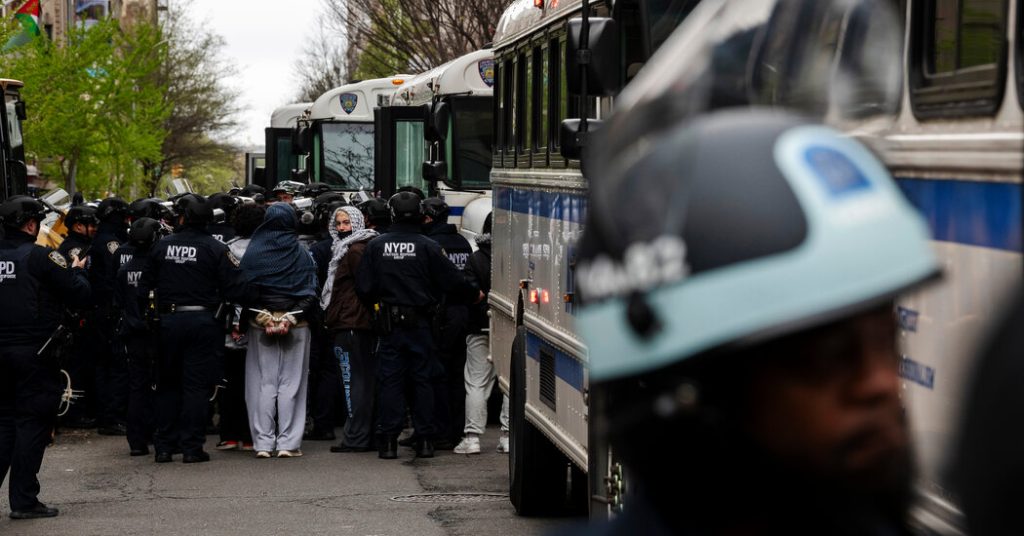
[ad_1]
Barnard College will allow most of the 53 students who were arrested and suspended after participating in a pro-Palestinian protest encampment at Columbia University to return to its campus, administrators said in a statement on Friday.
The college said that it had “reached resolution with nearly all students” who were arrested last week when Columbia asked the police to clear the encampment, a move that set off dozens of solidarity protests at campuses across the country and dozens of additional arrests at schools including Yale University, the University of Southern California and Emerson College.
Of the arrested students at Columbia’s original encampment, about half were from Barnard, a women’s college affiliated with the university that is across the street in Upper Manhattan.
Barnard said suspended students who reached agreements with the college on Friday would have their access to residence halls, dining facilities and classrooms immediately restored. Barnard was still working on agreements with some other students, it said.
“Barnard is committed to educating and supporting students with wide-ranging backgrounds and diverse perspectives,” the statement read. “We continue to work closely with faculty, staff and students to ensure the college remains a safe and inclusive place for our community.”
Tensions on college campuses have been high since the beginning of the Israel-Hamas war, and Columbia and Barnard have both been the site of ongoing antiwar protests, along with efforts to clamp down on protest chants and other forms of speech that many Jewish students, faculty and others view as antisemitic.
Columbia’s encampment sprung up on April 17, the same day that Nemat Shafik, the president of Columbia University, testified before Congress about antisemitism on elite college campuses. Ms. Shafik ordered New York City police to arrest the roughly 100 students involved, including those from Barnard.
Police officials said the arrested students had received summonses for trespassing. Some of the suspended Barnard students said that they received email warnings giving them 15 minutes to pack and leave. Several said they were sleeping at friends’ houses.
Columbia University Apartheid Divest, the student group organizing the encampment, said in a statement on Friday that Barnard’s decision to lift the suspensions would not have happened without “a mass movement of people inside and outside the Columbia community who mobilized to defend students’ basic right to housing.”
“We were evicted from our dorms, given fifteen minutes to collect our things, and left unable to access our prepaid meal plans,” the statement read. “We condemn Columbia and Barnard’s cowardly attempts to withhold food and housing from students to extract political concessions.”
Izzy Lapidus, a senior at Barnard who was among those suspended, said that the administration had offered students a variety of deals to lift their suspensions, but that the basic idea was that they could return to class and their dorms on the condition that they not break the rules again.
Negotiations between lawyers for the students and for the college went on for days, she said. She agreed to the terms, and had her suspension lifted Friday night, she said. She said she thought most but not all of the students would accept the offer, particularly the seniors who want to graduate.
Still, she remained upset about a punishment she felt had been unfair in the first place.
“We were peacefully protesting on our own campus lawns for Columbia University to divest and for a free Palestine,” she said. “While I’m grateful that the suspensions are overturned, they were incredibly unjust.”
Katherine Franke, a Columbia Law School professor who helped negotiate the agreement, said that she had been involved in negotiations on behalf of the Barnard students. The process began with a letter to administrators at Barnard and Columbia last Sunday arguing that the suspensions violated not just college rules, but state law, Ms. Franke said.
Columbia has not responded to the letter, Ms. Franke said, but Barnard responded right away.
“A lot of the students really were suffering severe mental health problems and physical health problems,” Ms. Franke said. “It impressed on me that we had to figure out some way to get them back in the dorms. A lot of them were weeks away from graduation. They couldn’t submit their papers or take their exams.”
While the agreement with Barnard immediately reinstated the students in question, those taking classes at Columbia, which are offered through their Barnard degrees, are still barred from the Columbia campus, Ms. Franke said.
Among the protesters, whose demands included that Columbia divest from companies connected to Israel, was one particularly high-profile name: Isra Hirsi, a Barnard student who is the daughter of Representative Ilhan Omar, Democrat of Minnesota. It was not clear on Friday night whether Ms. Hirsi was one of the students who had come to an agreement with Barnard.
In the months leading up to the tent protest at Columbia, Barnard enacted strict rules to tamp down campus unrest, including banning any dorm door decorations after students began posting stickers and slogans supporting the Palestinian cause.
“While many decorations and fixtures on doors serve as a means of helpful communication amongst peers, we are also aware that some may have the unintended effect of isolating those who have different views and beliefs,” Leslie Grinage, the dean of the college, wrote in an email to students.
Barnard also limited the spaces where students and faculty could protest. The policy changes prompted a strong response at Barnard, a school with a reputation for valuing activism.
Since the initial arrests, the encampment at Columbia has regrown to be even larger than before, but the university has said it is negotiating with students and has not called back in the police.
Katherine Rosman, Stephanie Saul and Sharon Otterman contributed reporting.
[ad_2]
Source link






